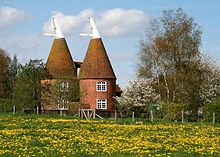Kent /ˈkɛnt/ is a county in South East England, and one of the home counties. The ceremonial county boundaries of Kent include the shire county of Kent and the unitary borough of Medway. Kent has a nominal border with France halfway through the Channel Tunnel, as well as a defined boundary with Essex in the middle of the Thames Estuary. The county also borders Greater London to the North West near the towns of Swanley and Dartford, Surrey near Westerham and East Sussex near Tunbridge Wells. Maidstone is its county town and historically Rochester and Canterbury have been accorded city status, though only the latter still holds it.
Kent's location between London and continental Europe has led to it being in the front line of several conflicts, including the Battle of Britain during World War II. East Kent was known as Hell Fire Corner during the conflict. England has relied on the county's ports to provide warships through much of the past 800 years; the Cinque Ports in the 12th–14th centuries and Chatham Dockyard in the 16th–20th centuries were of particular importance to the country's security. France can be seen clearly in fine weather from Folkestone, and the iconic White Cliffs of Dover.
Because of its abundance of orchards and hop gardens, Kent is traditionally known as "The Garden of England" – a name often applied when marketing the county or its produce, although other regions have tried to lay claim to the title. Large parts of Kent are within the London commuter belt. South and East Kent rely on tourism and agriculture. Coal mining has also played its part in Kent's industrial heritage.



Why Kent?
ReplyDeleteWhy not Wiltshire where I live?
I drive through it a few times on my way to the Continent.
So I thought, why not learn a little more about this beautiful county?
Then I can expound on it with our car party as we trundle through.